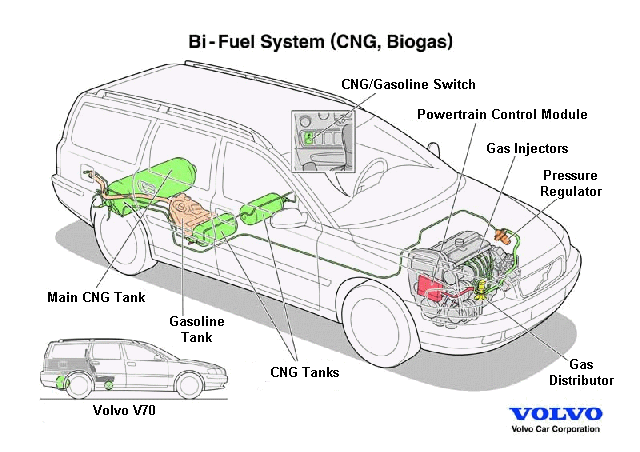Other possible solutions to the problems
 The
first possible solution to the problems would be to reduce the amount of Sulfur Dioxide and
NOx produced by machines that can run on alternative sources of energy. For
example, common transport vehicles such as buses, cars, and taxis, can be
switched to run on Compressed Natural Gas (CNG), either by changing the vehicle
entirely, or converted to a bi-fuel vehicle. CNG is a viable alternative, as it
emits significantly less NOx and Sulfur Dioxide compared to petrol. Moreover, it
is safer compared to other fuels in case of spills and may be mixed with biogas
produced, which doesn't increase the concentration of carbon in the atmosphere.
This greatly benefits the environment and reduces health concerns as the
concentration of the pollutants would be lowered. These advantages greatly
outweigh the drawbacks of CNG, such as the larger space requirement, and costly
conversion that saves money in the long term.
The
first possible solution to the problems would be to reduce the amount of Sulfur Dioxide and
NOx produced by machines that can run on alternative sources of energy. For
example, common transport vehicles such as buses, cars, and taxis, can be
switched to run on Compressed Natural Gas (CNG), either by changing the vehicle
entirely, or converted to a bi-fuel vehicle. CNG is a viable alternative, as it
emits significantly less NOx and Sulfur Dioxide compared to petrol. Moreover, it
is safer compared to other fuels in case of spills and may be mixed with biogas
produced, which doesn't increase the concentration of carbon in the atmosphere.
This greatly benefits the environment and reduces health concerns as the
concentration of the pollutants would be lowered. These advantages greatly
outweigh the drawbacks of CNG, such as the larger space requirement, and costly
conversion that saves money in the long term. A third possible
solution would be public education. Much of Sulfur Dioxide and NOx gases
produced are byproducts of factories and processes that produce products for
use by the general public. For example, sources of the gases include processes
like: the conversion of wood pulp to paper, incineration of rubbish refuse,
thermal power generation plants and the usage of synthetic fertilisers. As
such, emissions can be reduced by
educating the public on actions that result in air pollution, and how to reduce
them. Actions such as reducing nitrogen-based fertilizer applications and
applying fertilizers more efficiently, not smoking cigarettes, not burning of
any types of gases at high temperatures and not using aerosol cans (to reduce
reactions with oxides of Nitrogen that causes human respiratory problems).
A third possible
solution would be public education. Much of Sulfur Dioxide and NOx gases
produced are byproducts of factories and processes that produce products for
use by the general public. For example, sources of the gases include processes
like: the conversion of wood pulp to paper, incineration of rubbish refuse,
thermal power generation plants and the usage of synthetic fertilisers. As
such, emissions can be reduced by
educating the public on actions that result in air pollution, and how to reduce
them. Actions such as reducing nitrogen-based fertilizer applications and
applying fertilizers more efficiently, not smoking cigarettes, not burning of
any types of gases at high temperatures and not using aerosol cans (to reduce
reactions with oxides of Nitrogen that causes human respiratory problems).
SO2 + 2Ca(OH)2 → CaSO4 + 2H2O


http://www.publicagenda.org/citizen/issueguides/education
http://www.euro-matic.com/scrubb.html
http://economicpakistan.wordpress.com/2008/02/10/cng-industry/
Labels: solutionstoproblems

 Tuesday, 25 December 2012
Tuesday, 25 December 2012 